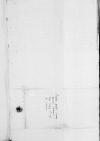List #778
Ioachimus CAMERARIUS do Ioannes DANTISCUSNuremberg, 1532-04-25
Rękopiśmienne podstawy źródłowe:
Pomocnicze podstawy źródłowe:
Publikacje:
| ||||||||||||||||||||||||||||
Tekst + aparat krytyczny + komentarzZwykły tekstTekst + komentarzTekst + aparat krytyczny
Amplissimo Antistiti
Salutem.
Etsi non ignorabam cum tuas occupationes maiores esse, quam ut nostris litteris vacare posses, tum illo has ineptiores, quam ut libenter legere velles, tamen nos written over (ost)ri⌈(ost)riosos written over (ost)ri⌉ officii nostri recordatio impulit, ut significaremus tibi gratitudinem animi nostri onerati a te maximis beneficiis humanitatis et benevolentiae, quod recte sic duxi, cum solicitudine non mediocri premar, quomodo, non dico, aliquid retulisse gratiae videamur,
cf. TER. Ph. 338 immo enim nemo sati pro merito gratiam regi refert ⌊quis enim – inquit ille – pro merito gratiam regi refertcf. TER. Ph. 338 immo enim nemo sati pro merito gratiam regi refert ⌋, sed ne indigni testimonio significationemque voluntatis tuae ha existimemur. Tu igitur, maxime clarissimeque atque etiam doctissime vir, velim tibi persuadeas, nos pro studio tuo benignitateque erga nos Tua sic gratos esse, ut qui maxime et subsu possit et debeat, cupereque tuae magnificentiae honoris nominis causa pro viribus nostris facere omnia, quod – ut confido – acceptum erit tibi perpendenti non facultatem sed promptitudinem voluntatis nostrae. Has etiam scito ad te litteras me scripsisse impulsu tuorum, hoc est
E
Has litteras vel fasciculum hunc potius misi ad optimum et singularium virtutum adulescentem
Tuae Excellentiae deditissimus


 UUB, H. 154, f. 81v
UUB, H. 154, f. 81v